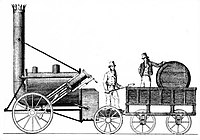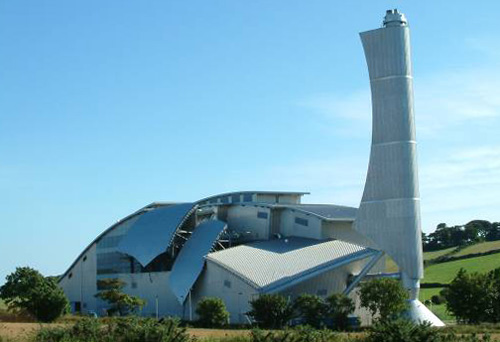The locomotive below, the Mallard, holds the record as the fastest steam locomotive. It was built in 1938 and saw service through until 1963. It reached 202.58 km/hr.
 |
| "Mallard" at the National Railway Museum at York. Source: Wikipedia |
 |
| Contemporary drawing of Rocket, Source: Wikipedia |
When the Ford Motor Company launched the Model T in 1908, the world of steam could never imagine that its world had just changed forever. But it did. In the space of a few decades, the car and personalised transport had changed everything. The urban form, the cultural psyche, even our modes of production.
At the turn of the 21st century, there is nothing bigger in the world of waste than a grand waste facility. They are imposing and yet sleek, and attract some of the most incredibly beautiful architecture. They dominate a world where landfill and waste is a problem to be solved by bigger and more sophisticated waste processing plants.
 |
| Isle of Man incinerator. Source: AEC online |
Just as there was significant diversity of design and application of the steam locomotive, so too there has been diversity in waste processing facilities. They have not yet, to my mind, had their Model T moment.
That moment is coming.
It will be a moment where waste ceases to be seen as a waste to be treated in isolation from an economy, but rather a resource to be incorporated into the economy.
I suspect that the change will radically dentralise waste, just as the car decentralised transport. I also suspect it will be driven by the capabilities that come from essentially free data, leading to a "peer to peer" waste handling system.
Just as the car removed the need to rely upon railways to get you to where you wanted to be, you just took yourself there, so too a peer to peer waste network will see waste transferred as a resource outside the infrastructure channels.
It will see data around waste becoming ubiquitous, creating a whole new market of intermediaries who "arbitrage" waste from a generator and deliver it to a manufacturer who needs that waste as a feedstock. Those intermediaries may, of course, refine and repackage the waste to suit, but they will not see themselves as waste operators.
When this change happens, the "economies of scale" which drive current waste handling will quickly become a liability. The new world will go to the nimble, the small scaled, the infinitely diverse. Sure, the world will rest on some pieces of infrastructure, but that infrastructure will no longer define the world.
I would take it further. The new world of waste will redefine how we see our manufacturing, our cities, ourselves. I don't quite know how this will happen, but I think it will run as deep as the cultural reverberation of the car (individuality and freedom getting an especial boost from the car).
To have the world shift from its current "single pass system", where materials are extracted, consumed and then dumped, and to a world in which materials are cycled through the economy over and over will be immense in its cultural impact.
For the time being, we continue to look at waste as a problem to be solved by large, sophisticated and incredibly complex waste processing plants. Just as transportation was seen as a problem to be solved by large, sophisticated and incredibly complex steam locomotives.
When this paradigm flips, it will flip rapidly. Fortunes will be made and lost, and waste will cease to be. We will have made another step forward in more efficient consumption of resources. This shift will, no doubt, bring with it a whole new set of problems. Problems that we cannot even conceive right now, but we need to make the shift all the same.

No comments:
Post a Comment